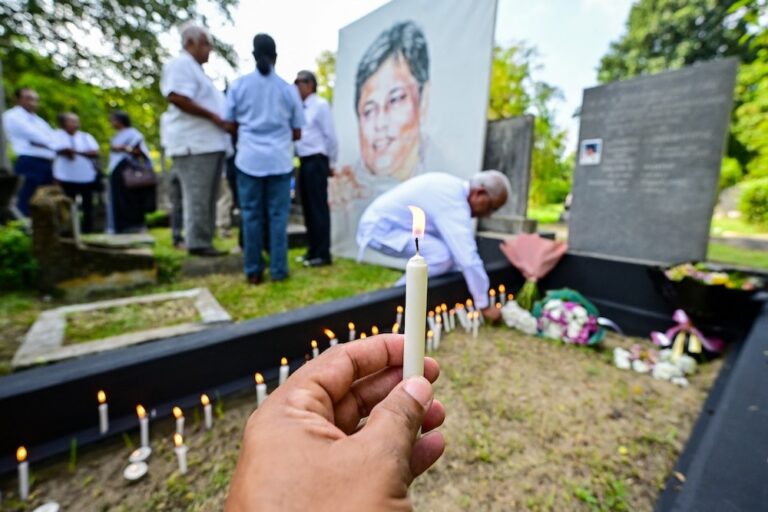(IPI/IFEX) – In a 21 June 2001 letter to President Chandrika Bandaranaike Kumaratunga, IPI expressed deep concern over recent articles appearing in two state newspapers and an independent newspaper accusing the editor of the Tamil Net of acting as a spy for the Liberation Tigers of Tamil Eelam (LTTE). According to information provided to IPI, […]
(IPI/IFEX) – In a 21 June 2001 letter to President Chandrika Bandaranaike Kumaratunga, IPI expressed deep concern over recent articles appearing in two state newspapers and an independent newspaper accusing the editor of the Tamil Net of acting as a spy for the Liberation Tigers of Tamil Eelam (LTTE).
According to information provided to IPI, the state-owned “Thinakaran” and “Divaina” newspapers and the independent English-language “Ceylon Daily News”, all published stories last week alleging that S. Sivaram, editor of the “Tamil Net” news website, was working for the LTTE. Under Sri Lankan law, the LTTE is a proscribed organisation and membership is a criminal offence. Although the “Ceylon Daily News” only reported that accusations had been made against Sivaram, both the “Thinakaran” and “Divaina” carried prominent articles together with photographs of the editor. In the case of the “Divaina”, the article also used the editor’s real name and his pen name.
Aside from the accusations of spying, the reports in the newspapers allege that Sivaram, a former Tamil militant, was directly connected with the execution of two people. Responding to the charges, Sivaram has stated that it is not the first time that these charges have been made against him, but that this time the use of his photograph and real name may endanger his wife and children. He also expressed fears that the articles would prevent him from carrying out his professional responsibilities as editor of the “Tamil Net”. In recent years, the website has gained a large following, both inside and outside the country, and has focused on human rights breaches against the Tamil minority in Sri Lanka.
IPI fears that these articles may be part of a concerted campaign by the government to silence Sivaram’s attempts to write about human rights violations against the Tamil minority in Sri Lanka. Furthermore, they appear to be part of a pattern of behaviour in which the government, or those connected to the government, make unsubstantiated claims against journalists without proper regard to the risk that such allegations carry.
On 18 July 2000, the pro-government “Jana Ravaya” published an article in which Sivaram and three other journalists were accused of “betraying the country to the Tigers (LTTE).” The initial accusations came from a group calling itself the Patriotic Journalists Front (PJF) which issued a press release stating that the journalists “gave military information to the Tiger’s movement.” In June of the same year, after a seminar organised by Tamil journalists, the PJF accused the same journalists of being linked to the LTTE. All of the accused vehemently deny the allegations and they have never been substantiated.
Another example occurred on 23 February, when the state run “Daily News” and “Dinamina” carried lead stories alleging that the United National Party (UNP) and the People’s Liberation Front (JVP) were conspiring to overthrow the government. The article in the “Dinamina” also mentioned the names of Saman Wagarachchi, editor of the “Peramuna”, and Sujeewa Gamage, editor of the “Peraliya”. According to the article: “The responsibility of carrying out the propaganda and media campaign for this plan had been entrusted to mediaman Saman Wagarachchi, formerly of the JVP and presently a member of the UNP.”
Given the heightened state of tension in Sri Lanka due to the war in the north of the country, such unfounded accusations can have a serious affect on those accused. Sri Lanka has a history of reprisals and vendettas against those who are perceived to collude against the government. As a result, journalists’ lives are actively being endangered.
Recommended Action
Send appeals to the president:
– calling on her to ensure that, within Sri Lanka, there is an environment in which journalists can practice their profession without fearing for their lives or being forced into hiding
– asking her to uphold the right of individuals to “seek, receive and impart information” in accordance with Article 19 of the United Nations Universal Declaration of Human Rights
Appeals To
H.E. Chandrika Bandaranaike Kumaratunga
President
Democratic Socialist Republic of Sri Lanka
Presidential Secretariat
Colombo-1, Sri Lanka
Fax: + 94 1 333 703
Please copy appeals to the source if possible.


